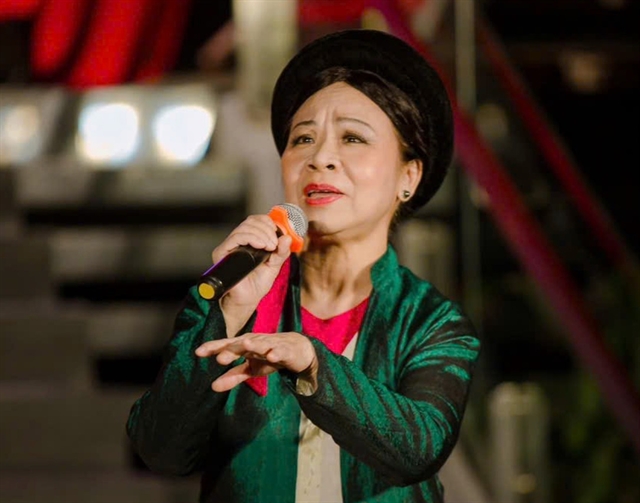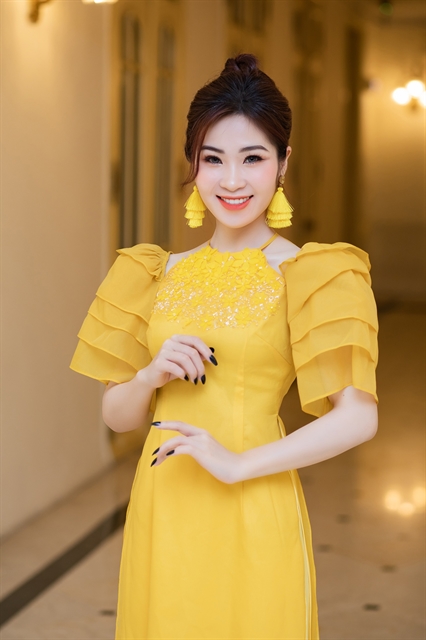 Inner Sanctum
Inner Sanctum

With a passion and devotion for Vietnamese traditional culture, singer Hà Myo (real name Nguyễn Ngọc Hà) has been honoured with the title of 'Vietnamese Promising Young Face 2021'. She talks to Ngô Minh about her motivation in music.
With a passion and devotion for Vietnamese traditional culture, singer Hà Myo (real name Nguyễn Ngọc Hà) has been honoured with the title of 'Vietnamese Promising Young Face 2021'. She talks to Ngô Minh about her motivation in music.

|
| Singer Hà Myo (centre) has innovated blind buskers' music by combining folk tunes with rap and EDM. Photo courtesy of the artist |
Inner Sanctum: You have released videos combining hát xẩm (strolling blind buskers' songs) with modern EDM, rap, hip-hop and pop. Do you think being awarded the title of "Vietnamese Promising Young Face 2021" proved your musical decisions were the right ones?
Blind buskers' music is not known widely by audiences nowadays, because it originated many decades ago, and is not suitable for modern music trends. However, as a genre of folk music, it shows the most sincere and true things about the Vietnamese land and people in the past. It however still has a place in Vietnamese culture.
I fell in love with blind buskers' songs like a young girl finds the love of her life. It’s hard to explain. I love it for no reason at all. Busking of blind musicians and I just matched each other, luckily.
Inner Sanctum: Does the award give you pressure or motivation, if any?
Both. I am so happy that my devotion has been recognised and encouraged.
You know, breaking the principles of traditional art always causes controversy. When I decided to renovate blind buskers' songs, it was a daring decision. Whenever I release a new piece, I feel nervous that some may like me and some may boycott me. So when I received the prize from President Nguyễn Xuân Phúc, it was great happiness.
Indeed, with the title "Promising Vietnamese Young Face 2021", I feel more confident to walk the way I choose, but I still have a pressure to be better, try harder, and not stop at blind buskers' music but discover my creativity in another genre.
Inner Sanctum: Why did you decide to experiment with blind buskers' music? What difficulties did you face?
I did not listen to much. Blind buskers' songs have some basic melodies. I heard just a little bit to have an overview of each one because I was afraid of being influenced by other people’s styles.
I came to blind buskers' singing like a blank sheet of paper. Maybe that’s why right from the start, I could sing their songs in my own way.
Inner Sanctum: You predicted your remix of blind buskers' music would face criticism. How did you prepare for this?
When I combined songs of strolling blind musicians with other modern types of music, I was determined but also full of worry. I worried that this unprecedented combination would distort the content, music structure, and style or that I would not be able to help the street singers' outworn music find a place on the modern stage?
Also, it was a turning point in my career. If the audience or entertainment industry was not satisfied, I could easily be boycotted.
Inner Sanctum: How did you receive compliments and criticisms?
Audience comments are always multidimensional. They were praising, criticising, admiring, and reprobating.
Some people said that buskers' music became joyful and new thanks to me. Others say that I was destroying its feel. Many people said that thanks to me, they got to know the art of xẩm.
In the end, whether it’s praise or criticism, I am still proud of overcoming my own limits to do this “crazy” thing. I smile at the positive comments and think about what to do in the future to make the negative comments disappear.
I also realised that blind buskers' music is an art that has been associated with the Vietnamese people for generations. They have so much love and care for this music, so they give comments. I hope that I can continue to make small contributions to the cause of preserving and developing this art genre.
Inner Sanctum: Recently, you released the music video Đập Nàng Khọt (Phoebe Landing on Earth), a Mường ethnic folk song combined with rap and EDM. Do you always try to expand your limits?
My father is a Mường ethnic. This song is one of the most familiar songs of the Mường. Since I was a student, I have performed it many times, so I chose it to produce a new song. The music video celebrated the Vietnamese Promising Young Face 2021 prize.
But I will not only stop at blind buskers' music and try to discover myself in other traditional genres.
After the experiment on buskers' music, I cherished the idea of combining folk with modern music to bring national pride to young music lovers and international friends.
I spent many years struggling to find my own path. Now that I see it, there is no reason not to move on. I will be a strong, modern young singer who knows how to exploit and renew traditional art. I accept the challenge and am ready to take the lead. Of course, there will be difficulties and challenges, but if I make the audience, especially the young, love the nation’s traditional art, my effort will be well worth it.

|
| Hà Myo has been honoured with the title of Vietnamese Promising Young Face 2021. Photo courtesy of the artist |
Inner Sanctum: With rap and EDM, your music can go beyond the borders of Việt Nam. Do you intend to interact with foreign audiences more?
Currently, I am working at the Việt Nam Music and Dance Theatre. There are many opportunities to bring our blind buskers' music to the international stage with cultural exchange programmes.
However, in the future, I want to have breakthroughs in terms of communication and support from the Ministry of Culture, Sports and Tourism, and organisations to help pave the way for folk singing to be promoted abroad.
YouTube is also a very good channel to popularise my music. I have seen many foreign comments on this media about traditional Vietnamese music.
All of my music is available on the Ha Myo official YouTube channel. Hopefully, my music will also have the opportunity to reach foreign audiences through social media. The music that I am working on is close to world music, and hopefully, because of that, our folk music will easily spread to the international market.
Inner Sanctum: How will you combine traditional and modern music into a ‘world music’ product?
In terms of blind buskers' music, I had the help of experts in this field, such as artist Văn Ty and musician Nguyễn Quang Long. My husband, EDM music producer Thế Phương, helps me transform blind buskers' songs in accordance with the beat.
Some sentences need to be sung softly, some need witty irony, and some need to reach high so as not to be overshadowed by the EDM.
With his electronic music knowledge, Phương has combined the energy of electronic music with typical blind buskers' musical instruments such as the đàn nhị (two-chord fiddle).
Linking together the music requires a clear understanding of the characteristics of each musical genre, then selecting the most characteristic features of each and combining them to avoid confusion or loss of each other’s characteristics.
Inner Sanctum: Do you have plans for your future music?
I always have a lot of plans and ideas. With a desire to bring traditional music to young people, I hope to have enough health and money and support from audiences to continue my projects. VNS